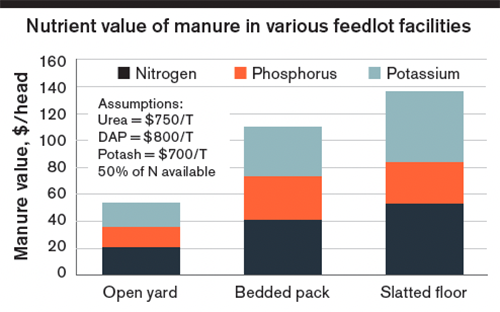
When discussing feedlot profitability, producers may often talk about the cost of gain or break-even costs. If manure enters the discussion, it is often referred to as an expense, but extension feedlot specialist Warren Rusche reminded cattle feeders to not underestimate the value of manure collected from feedlots in a recent South Dakota State University article.
The value of manure varies depending on the type of facility, as shown in the figure. Using $750 per ton for urea, $800 per ton for diammonium phosphate (DAP), and $700 per ton for potash, a 999-head beef facility would generate $52,000 worth of crop nutrients in an open yard, $110,000 in a bedded-pack barn, and $135,000 in a slatted floor barn. These numbers assume that cattle are housed in the facility year-round and that 50% of the manure nitrogen is available for crop use. The manure nutrient value would be even higher at current fertilizer price levels.
Rusche recommended taking a strategic approach to manure application to capture its value. This includes collecting representative samples and submitting them for accurate laboratory analysis, prioritizing fields based on soil fertility, and taking steps to reduce nutrient losses, such as knifing in liquid manure or incorporating solid manure.
“If cattle feeders are going to capitalize on this resource, they need to make sure they do not treat manure, well . . . like manure,” he wrote.
This article appeared in the February 2022 issue of Journal of Nutrient Management on page 5. Not a subscriber? Click to get the print magazine.









